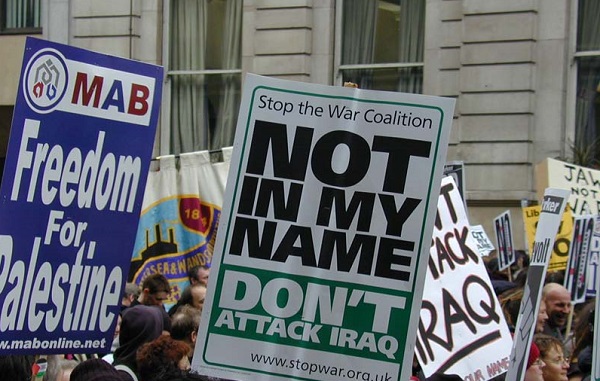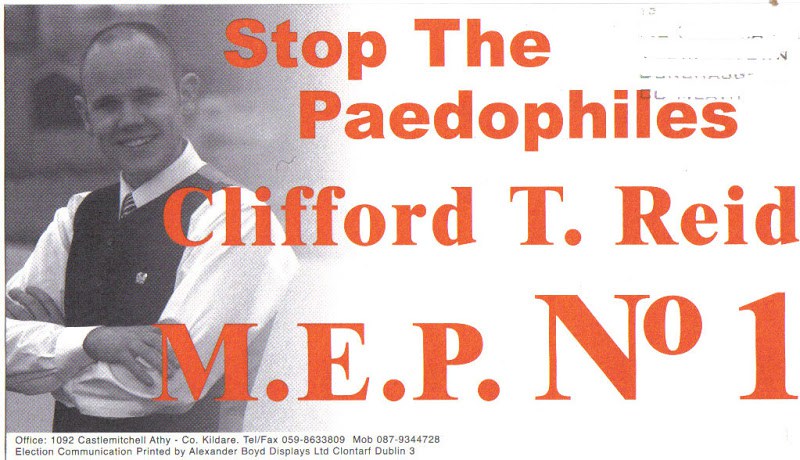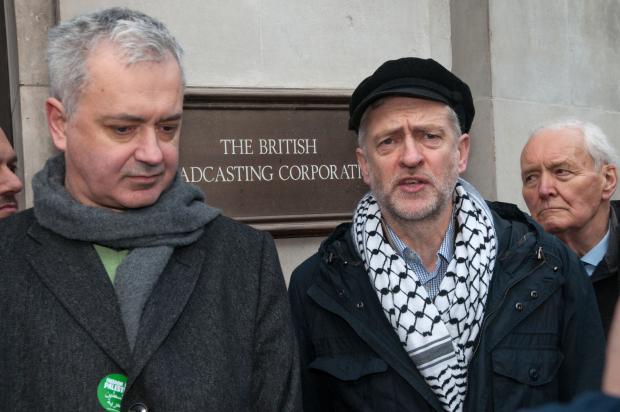
*note: Richard Herring has withdrawn from the planned Stop The War Coalition benefit mentioned in this article
In its sordid history, the Stop the War Coalition has got one thing right: its branding. Who doesn’t want to prevent war, after all? You oppose Stop the War? What are you, “pro-war”? A warmonger? Look me in the eye and tell me you don’t mong wars.
Only one political campaign has had a better brand - that of aspiring Irish MEP Clifford T Reid, who ran the European Parliament in 2004 under the slogan “Stop The Paedophiles”. Surprisingly, Clifford never made it to Brussels, which makes one worry about the priorities of the voters of the voters of east Ireland.

The quality of its branding appears to be the main reason why Stop the War can still attract support from a range of people who you would hope would normally not be seen dead near the crude, reactionary anti-imperialism it espouses. Next month, for example, comics Stewart Lee and Richard Herring, among others, are scheduled to play a benefit gig for the Stop the War Coalition. Not, note, a benefit for the victims of war, or for those who seek to help the victims of war, but for the Coalition itself, which has achieved absolutely nothing in terms of supporting those suffering under Assad’s barrel bombs and Islamic State’s execution squads, or, even, for those killed by British-built Saudi bombs in Yemen.
Established shortly after the World Trade Center attacks 15 years ago, the Stop the War Coalition brought together the cream of British Stalinism and Trotskyism, minus the Socialist Party of England and Wales (SPEW. Yes, really), plus the Muslim Brotherhood-linked Muslim Association of Britain in an alliance against western foreign policy and the “war on terror”.
The group reached its peak with the anti-war march of February 2003, when hundreds of thousands marched against the impending invasion of Iraq.
As Paul Anderson and Kevin Davey have pointed out in these pages: “It would be ludicrous to claim that many of the 15 February demonstrators were signed-up Leninists. But the Stop the War organisers and spokespeople for the movement for the most part were: Rees and German from the SWP; the organisation’s chair, Andrew Murray, a leading figure in the Stalinist Straight Left fraction of the 1970s and 1980s (a bizarre secretive group that operated both in the CPGB and the Labour Party), who had become a member of the CPB central committee and an official for the train drivers’ union Aslef [Murray is now UNITE chief Len McCluskey’s right hand man]; the Labour MP George Galloway (expelled from the party in autumn 2003 for bringing Labour into disrepute after calling on British troops to refuse to obey orders); Kate Hudson, chair of CND and a member of the CPB.”

This meant little to the hundreds of thousands who marched that day, who felt that the war in Iraq was a bad idea; most, justifiably, will still feel the same.
But the beliefs of its founders and leaders are instructive when we look at where it went next.
If 2003 pushed the Stop the War Coalition’s assortments of Tankies and Trotsktyists into the mainstream of anti-war opinion, Israel’s 2006 incursion into Lebanon revealed what the coalition was really about: this was the time when the leadership led the chant ‘We are all Hezbollah.” At this point, the penny dropped for many: Stop the War was not necessarily anti-war; it was just on the other side of the war from western foreign policy. This was not a peace movement.
And yet the brand ensured that they maintained a certain level of respect (indeed, RESPECT, the spin-off political party, had by this point won a parliamentary seat for George Galloway, pre-hat, in Bethnal Green and Bow).
The coalition trundled on, even after characteristically bitter far left fallings out. John Rees and Lindsey German, the SWP cadres who had been the driving force behind Stop the War and RESPECT, split with the SWP after the party realised that it wasn’t going to win loads of elections and simultaneously remembered that, as a revolutionary grouping, it didn’t even want to win elections anyway (so there!), yet still worked with former comrades on Stop the War. George Galloway remained a patron, in spite of the fact he uses “Trotskyite” as an insult.
On the occasion of its tenth anniversary in 2011, as Syria was beginning to burn, the coalition held a big march, because, well, that’s what you do, isn’t it? I went because I was bored that day. It was a bleak affair. John Pilger, a coalition fellow traveller, told the crowd that “the feminists” had been to blame for the invasion of Afghanistan. Julian Assange turned up and talked about Julian Assange. In a tent to the side of the main platform, a young Syrian man was furiously shouted down when he dared to question Hezbollah’s presence in his country, fighting on the side of Assad. John Rees, chairing, looked on. The cameras of Russia Today and Iran’s Press TV rolled. Several Stop the War types, including, famously, the current Labour leader Jeremy Corbyn, have made money from appearing on these “alternative news channels”.
Taking an interest in all this may seem a little esoteric, but the problem is it does matter. It matters when the supposedly “anti-war” George Galloway praises the Assad regime as “the last castle of Arab dignity”. It matters when Stop the War publishes articles complaining that Vladimir Putin has been “demonised” and that the real aggressor in Crimea is NATO. It matters that the supposed anti-war movement contains members of the Communist Party of Britain, a group that expresses solidarity with the psychopathic Juche regime of North Korea.
And it matters that respected artists such as actor Mark Rylance, who is a patron, and lauded comics such as Stewart Lee and Richard Herring offer their support, time and talent to these supporters of tyrants.
In the past few years, tens of thousands have died because of the actions of the regimes supported by members of the Stop the War Coalition. Stop the War’s allies do not help victims of war, they create them. The posturing “anti-war” activists deserve nothing but contempt.